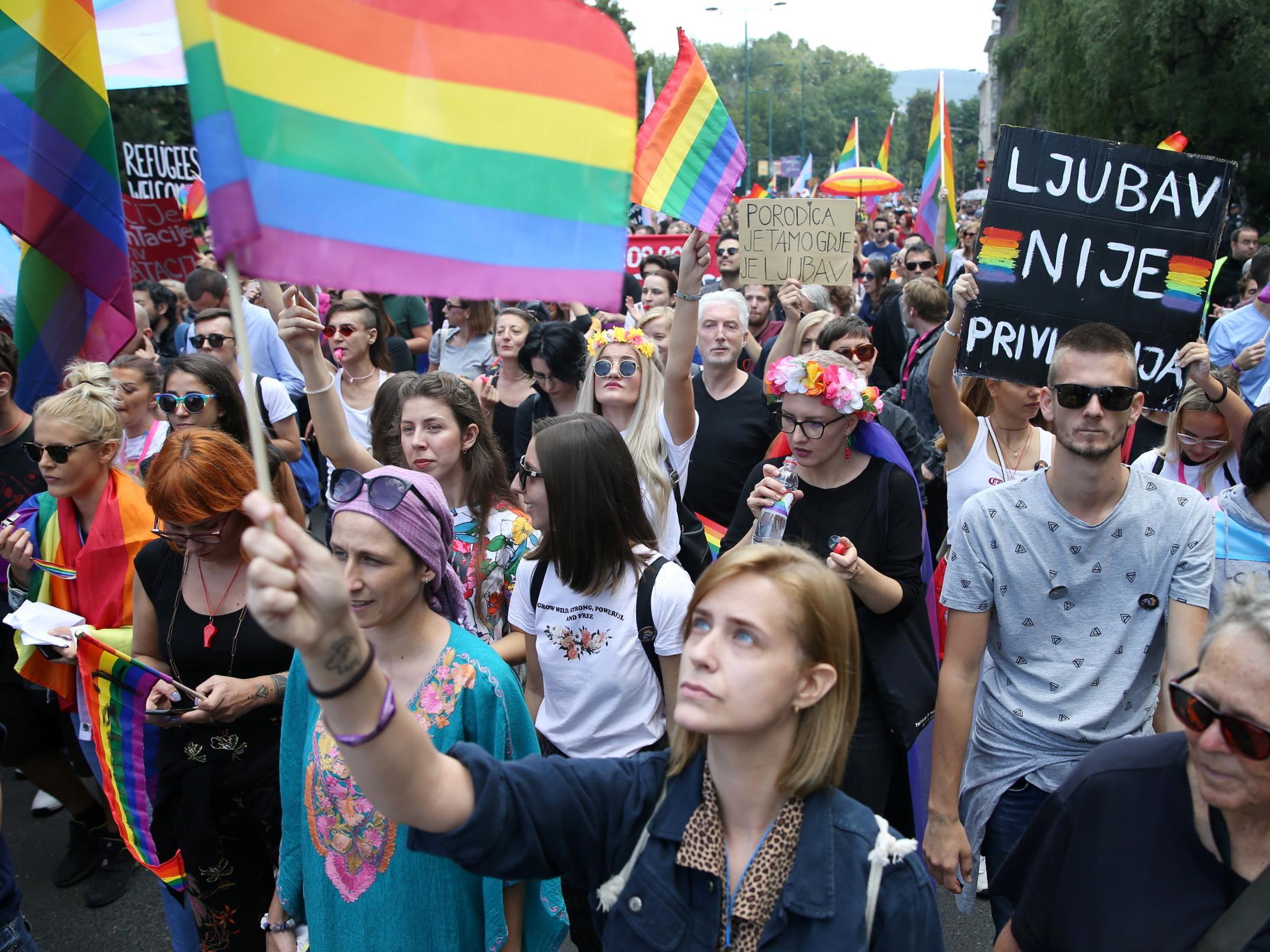Bosnian capital holds first Pride parade amid counter protests and a backdrop of violent opposition
Mile away from march, counter-protests rolled into their second day in traditionally conservative nation’s capital

Your support helps us to tell the story
From reproductive rights to climate change to Big Tech, The Independent is on the ground when the story is developing. Whether it's investigating the financials of Elon Musk's pro-Trump PAC or producing our latest documentary, 'The A Word', which shines a light on the American women fighting for reproductive rights, we know how important it is to parse out the facts from the messaging.
At such a critical moment in US history, we need reporters on the ground. Your donation allows us to keep sending journalists to speak to both sides of the story.
The Independent is trusted by Americans across the entire political spectrum. And unlike many other quality news outlets, we choose not to lock Americans out of our reporting and analysis with paywalls. We believe quality journalism should be available to everyone, paid for by those who can afford it.
Your support makes all the difference.Sarajevo has become the latest and last of the Balkan capitals to hold its first Pride parade as LGBT+ activists in Bosnia and Herzegovina marched amid a backdrop of protests and aggression from conservative voices in the country.
Led by a vast pink banner with the words “Ima Izac” – which translates as ‘Coming Out’ – attendees marched under rainbow flags to the sounds of whistles and drums as they used the event to highlight the ongoing violence and discrimination faced by LGBT+ people in the country.
Members of the community have complained that they face widespread harassment and attacks which are rarely prosecuted.
Organiser Llejla Huremagic told the gathering: "If there was no violence I wouldn't be here today,"
"This gives us strength and faith that prejudice against us will start to wane and that it will become better for all of us."
Protesters were flanked by more than 1,000 police officers to limit potential violence and aggression from groups opposing the march – with planned counter protests and a history of disruption at LGBT+ events in the traditionally conservative country casting a shadow over proceedings.
In 2008, eight people including a police officer were injured at the Queer Sarajevo Festival when counter-protestors attacked festival-goers, while in 2014 the city’s Merlinka Queer Film Festival was stormed by a dozen masked men who shouted homophobic abuse, injured three people and declared “there will be no Pride parade in Sarajevo”.
Speaking to attendants of the city’s first parade, Huremagic added defiantly: "We are here, we exist ... we have the courage to fight for our lives."
Among the attendees was US ambassador to Bosnia and Herzegovnia Eric Gordon Nelson, who became a focus of opposition in the run up to the march.
Posters depicting Nelson, who is gay, along with the slogan ‘gay is not OK’ appeared in the Sarajevo suburb of Dobrinja near a US university on Friday.
Photos from the event showed Mr Nelson amongst the crowd flanked by plain clothes security personnel. Ahead of the event he said: “The US Embassy expresses support to the first Pride March in Bosnia and Herzegovina. The goal of the pride parade is equal human rights for all.
“Me and my partner appreciate the welcome and respect we received here. I will take part in the Pride March to give support to all LGBT+I community members and their families."
A mile away from the event, counter protests rolled into their second day, with opposing voices having already organised on Saturday with a gathering designed to promote “family values”.
Among those opposing the march were Iskorak, a group of conservative Muslims who described the event as a “sin” and a “humiliation” before holding a symbolic prayer at the end of the protest.
Sanin Musa, an Islamic theologian who chairs the group, said: "They want to bring this into our streets, our squares – among our children.
"We want to fight against this, we are fighting against their LGBT+ way of life, which is being introduced into our schools, our homes, our universities."
Additional Reporting by AP
Join our commenting forum
Join thought-provoking conversations, follow other Independent readers and see their replies
Comments